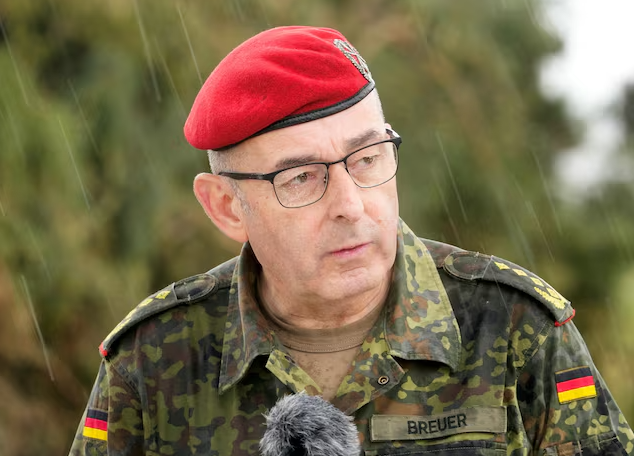
Germany Sounds the Alarm: Military Chief Orders Full War Readiness by 2029

In a move that marks one of the most urgent shifts in German defense posture since the Cold War, General Carsten Breuer, Chief of Defence for Germany, has ordered a rapid and sweeping overhaul of the nation's military capabilities, with a hard deadline of 2029 to achieve full operational readiness. The directive, signed on May 19 and obtained by Reuters, outlines a transformative vision aimed at equipping the Bundeswehr with the tools needed to face a drastically changing global security landscape—one in which Russia could once again pose a direct threat to NATO territory.
The decision comes amid mounting concerns within NATO that the window for deterrence is narrowing. Intelligence assessments and military forecasts presented by senior NATO leaders suggest that Russia, fueled by a wartime economy and large-scale mobilization efforts, could be capable of launching a large-scale conventional attack on NATO allies as early as 2029. According to Army Chief Alfons Mais, who spoke earlier this month, “From 2029, at the latest, the Russian forces will be capable of a conventional aggression against NATO territory on a large scale. But they can start testing us much sooner.”
Breuer’s document, titled “Directive Priorities for the Bolstering of Readiness,” is more than just a warning—it’s a clear and actionable order. It sets explicit procurement and strategic development priorities and signals a serious acceleration of Germany’s defense agenda. This includes revitalizing Germany’s air defenses, boosting ammunition stockpiles, advancing deep-strike missile capabilities, and expanding the country's presence and resilience in the domains of cyber and space warfare.
A significant enabler for this military renaissance is the controversial loosening of Germany’s constitutional “debt brake,” a fiscal rule that has long constrained public spending. In March, the government relaxed this rule to unlock tens of billions of euros in defense investment, marking a fiscal shift that has triggered intense political debate but received approval from top defense officials. With these new funds, Berlin intends to finance a military modernization plan that had long been discussed but never executed at this scale or pace.
Air defense is front and center in Breuer’s directive. The document identifies a critical need to fortify Germany’s ability to counter modern aerial threats, especially drones, which have become a cornerstone of hybrid and conventional warfare in recent conflicts such as the war in Ukraine. Germany’s existing air defense capabilities have been described as “depleted” by multiple NATO assessments. According to sources cited by Reuters last year, NATO is expected to ask Germany to quadruple its air defense assets, from long-range Patriot systems to more mobile, short-range solutions capable of protecting forward-deployed troops and civilian populations alike.
Another top priority is long-range precision strike capability—a leap in Germany’s defense doctrine. Breuer’s directive explicitly calls for the development or procurement of systems that can strike targets over 500 kilometers away, deep into enemy territory. This is a significant departure from Germany’s post-WWII defense posture, which has traditionally eschewed offensive capabilities in favor of territorial defense. The inclusion of deep-strike weapons suggests that Germany is preparing not just to deter attacks but to respond with force if deterrence fails.
Breuer has also ordered the rapid replenishment of ammunition stockpiles, a glaring deficiency exposed by the ongoing support for Ukraine. Germany, like many NATO countries, has struggled to maintain sufficient munition reserves while continuing to supply Kyiv. The directive mandates increased stockpile targets across all categories of ammunition, indicating that Berlin intends to ensure long-term sustainability in any future conflict scenario.
The directive further emphasizes the importance of electronic warfare—a fast-growing frontier in modern combat. As conflicts become more digitized, with cyberattacks and electronic disruption playing key roles, Germany aims to build robust offensive and defensive capabilities in this space. In a similar vein, Breuer has ordered the development of a resilient military presence in space. This includes both protecting critical satellite infrastructure and developing the capability to conduct operations in orbit, a domain that has seen increased militarization by global powers in recent years.
The sweeping nature of Breuer’s orders is a reflection of how drastically security dynamics have shifted in Europe since Russia’s full-scale invasion of Ukraine in 2022. For decades, Germany maintained a relatively restrained military posture, relying heavily on the NATO alliance and its economic power as tools of deterrence. However, recent years have brought a sobering realization: peace on the continent cannot be taken for granted.
Germany’s defense transformation is also closely watched by its NATO allies. As Europe’s largest economy and a central pillar of the alliance, Germany’s ability to field a credible and modern military force is seen as critical to NATO’s collective defense. While countries like Poland, the Baltic states, and Finland have ramped up defense spending at a rapid pace, Germany’s Bundeswehr has often been criticized for chronic underfunding, outdated equipment, and bureaucratic inertia. Breuer’s directive aims to turn that reputation around.
The defense ministry in Berlin has not yet publicly commented on the directive, but political leaders across the spectrum are already bracing for what could be the most ambitious and expensive military buildup in modern German history. Public opinion remains divided, especially given the country's historical aversion to militarism and the economic pressures still lingering in the post-pandemic period.
Nevertheless, the urgency conveyed in Breuer’s directive is unmistakable. With Russia’s war economy accelerating and tensions with the West showing no signs of abating, Germany appears ready to discard its long-standing defense caution in favor of a more assertive, forward-looking strategy.
In a world where geopolitical fault lines are once again hardening, Germany’s pivot is not just a national strategy—it’s a signal to allies and adversaries alike that Europe’s center is ready to stand its ground. By 2029, the Bundeswehr is expected to emerge not as a passive participant in global security, but as a fully equipped, fully committed force prepared to meet the challenges of a more dangerous world.


